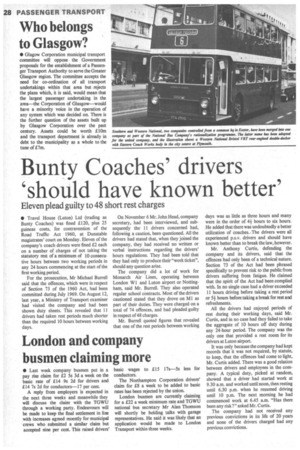Bunty Coaches' drivers 'should have known better'
Page 30

If you've noticed an error in this article please click here to report it so we can fix it.
Eleven plead guilty to 48 short rest charges
• Travel House (Luton) Ltd (trading as Bunty Coaches) was fined £120, plus 25 guineas costs, for contravention of the Road Traffic Act 1960, at Dunstable magistrates' court on Monday. Eleven of the company's coach drivers were fined £2 each on a number of charges of not taking the statutory rest of a minimum of 10 consecutive hours between two working periods in any 24 hours commencing at the start of the first working period.
For the prosecution, Mr Michael Burrell said that the offences, which were in respect of Section 73 of the 1960 Act, had been committed during July 1969. On August 12, last year, a Ministry of Transport examiner had visited the company and had been shown duty sheets. This revealed that 11 drivers had taken rest periods much shorter than the required 10 hours between working days. On November 6 Mr. John Head, company secretary, had been interviewed, and subsequently the 11 drivers concerned had, following a caution, been questioned. All the drivers had stated that, when they joined the company, they had received no written or verbal instructions regarding the drivers' hours regulations. They had been told that they had only to produce their "work ticket", should any question arise.
The company did a lot of work for Monarch Air Lines, operating between London WI and Luton airport or Nottingham, said Mr. Burrell. They also operated regular school contracts. Most of the drivers cautioned stated that they drove on MI as part of their duties. They were charged on a total of 74 offences, and had pleaded guilty in respect of 48 charges.
Mr. Burrell quoted figures that revealed that one of the rest periods between working days was as little as three hours and many were in the order of 4+ hours to six hours. He added that there was undoubtedly a better utilization of coaches. The drivers were all experienced p.s.v. drivers and should have known better than to break the law, however.
Mr. Anthony Curtis, defending the company and its drivers, said that the offences had only been of a technical nature. Section 73 of the Act had been phrased specifically to prevent risk to the public from drivers suffering from fatigue. He claimed that the spirit of the Act had been complied with. In no single case had a driver exceeded 11 hours driving before taking a rest period or 5+ hours before taking a break for rest and refreshments.
All the drivers had enjoyed periods of rest during their working days, said Mr. Curtis, and in no case had they failed to take the aggregate of 10 hours off duty during any 24-hour period. The company was the only one that provided a rest room for its drivers at Luton airport.
It was only because the company had kept records that it was not required, by statute, to keep, that the offences had come to light, Mr. Curtis added. There was a good relation between drivers and employees in the company. A typical duty, picked at random, showed that a driver had started work at 9.30 a.m. and worked until noon, then resting until 6.30 p.m. when he resumed driving until 10 p.m. The next morning he had commenced work at 6.45 a.m. "Has there been any risk?" asked Mr. Curtis.
The company had not received any previous convictions in its life of 20 years and none of the drivers charged had any previous convictions.




































































































